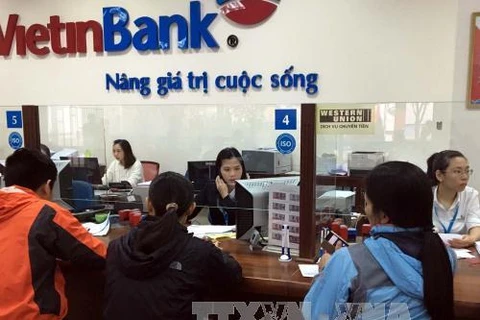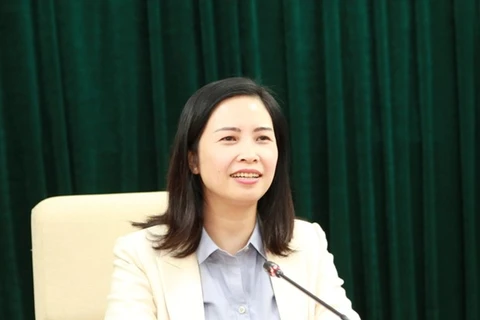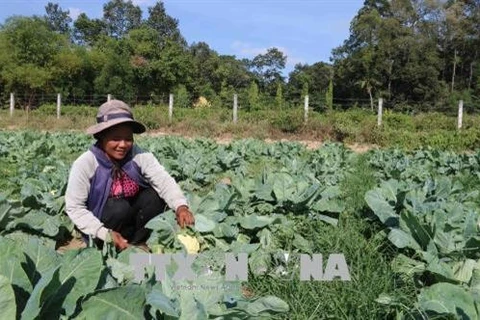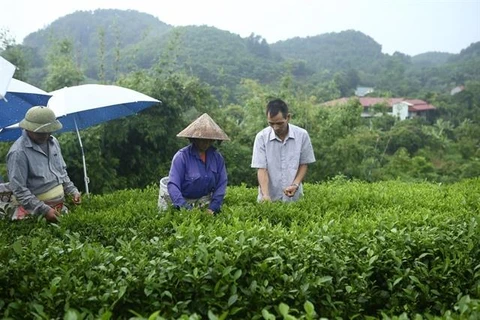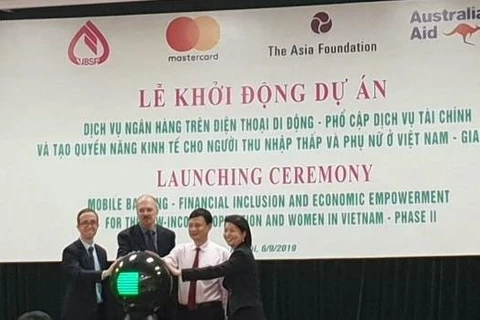 Farmers in Ea Nuoi commune of Buon Don district, the Central Highlands province of Dak Lak, tend coffee trees (Photo: VNA)
Farmers in Ea Nuoi commune of Buon Don district, the Central Highlands province of Dak Lak, tend coffee trees (Photo: VNA) Hanoi (VNA) – Social policy credit has reached all the communal-level localities nationwide, greatly helping with efforts towards sustainable poverty reduction, heard a teleconference in Hanoi on September 23.
The event, looking into the role and effectiveness of social policy credit in poverty elimination, was held by the central steering committee for national target programmes for 2016 – 2020.
General Director of the Vietnam Bank for Social Policies (VBSP) Duong Quyet Thang reported that from 2016 through 2018, nearly 8 million poor households and others with disadvantages received loans from the VBSP totaling 221.69 trillion VND (9.5 billion USD at the current exchange rate).
That has helped more than 1.4 million households escape from poverty, created jobs for over 775,000 people, and assisted almost 200,000 underprivileged students to continue their study. The lending has also helped build nearly 4.9 million rural water and sanitation facilities, along with more than 108,000 houses for the poor.
He noted social policy credit, part of which is entrusted to the VBSP by localities as well as domestic and foreign organisations and individuals, has been funding more than 20 programmes and projects so far.
By the end of August 2019, total funds had surpassed 207.7 trillion VND while outstanding loans topped 199.82 trillion VND, up about 63 trillion VND and 57.29 trillion VND from 2015, respectively. The annual credit growth rate was 9.7 percent.
Vice Chairman of the Vietnam Farmers’ Union Nguyen Xuan Dinh said over the last five years, social policy credit entrusted to the union has become funding for over 3 million poor and near-poor households and other underprivileged groups to improve their livelihood. It has also benefited nearly 132,500 disadvantaged students and financed the building of over 2 million water and sanitation facilities, along with 115,000 houses for low-income earners.
The credit has helped bring the household poverty rate down from 5.97 percent in 2015 to 5.5 percent in 2018 and practically supported the new-style rural area building, Dinh added.
Recognising the effectiveness of social policy credit, Deputy Prime Minister Vuong Dinh Hue, head of the central steering committee, said the VBSP and social policy credit form an important pillar of the national target programme on sustainable poverty reduction. Thanks to this pillar, the number of impoverished households declined “very fast” between 2015 and 2018, helping to fight loan sharking and implement the national target programme on new-style rural area building.
He asked local administrations to enhance their leadership over social policy credit provision and better mobilise resources for it.
The Deputy PM also requested the Finance Ministry, the State Bank of Vietnam and the VBSP to consider proposals raised at the meeting to improve its lending policy such as loosening lending limits, extending the term of loans given to the households that have just risen above the poverty line, and raising the limits of lending for production activities and clean water programmes.
From 2020 to 2025, the VBSP must raise its annual credit growth rate to at least 10 percent, Hue said, calling on the Vietnam Fatherland Front to promote the “For the poor” campaign to mobilise more donations from organisations, businesses and individuals to increase credit capital./.
VNA
